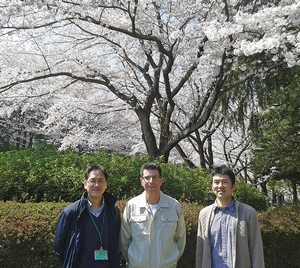Global science: Validating bioadhesives’ green credentials

Drs Shin-ichiro Tohmura (left), Warren Grigsby and Kohta Miyamoto enjoying the cherry blossom in Tsukuba.
Working together and sharing knowledge helps scientists from around the globe solve some of the many and complex challenges facing today’s communities, and discover ways to achieve a more sustainable bio-based economy.
Over the years, Scion’s scientists have developed an extensive network of international and national collaborations that share the common goal of extending our scientific knowledge and developing innovative technologies to enhance the quality of our environment, and reduce the toll on our planet’s resources.
Some of our wide-reaching projects and capabilities include:
Validating bioadhesives’ green credentials
Bio-based adhesives and resins for use in wood-based panels have a much lower environmental footprint, and are more socially acceptable, than their traditional formaldehyde-based counterparts. Dr Warren Grigsby has been developing adhesives from natural sources, such as tree bark, that have been shown to have a 22% lower environmental impact over their entire lifecycle than conventional adhesives (see Scion Connections, issue 11, March 2014).
Wood is a sustainable and dependable resource. Even more rewarding is that the manufacturing of bioadhesives uses parts of the tree that would otherwise go to waste while also reducing the use of fossil resources and greenhouse gas emissions. Lignin’s structure, abundance and low cost offer good potential to replace petrochemicals in bioadhesives.
Warren recently spent three weeks in Tsukuba, the ‘science city’ of Japan, on a Japan Society for Promotion of Science Invitational Fellowship. Part of his time there was spent working with colleagues at Forest & Forest Products Research Institute (FFPRI) on a collaborative project to assess the emissions produced from wood panels using bioadhesives. The emissions from individual adhesive components of forestry and agricultural processing residues, such as lignin, were also assessed.
“This fellowship gave me the opportunity to tap into the institute’s ability to look at volatile emissions,” explains Warren. “We assessed volatile organic compounds that were emitted during the hot press manufacturing of hardwood plywood panels using bioadhesives, and the subsequent panel emissions released over seven days. The results clearly showed that our bioadhesives have very low formaldehyde emissions, which were lower than wood, and that lignin and tannin use contributed to this. We intend to implement these outcomes were at Scion using our new olfactory capabilities.
“One of the hurdles for the wood processing industry to overcome is the acceptance of bioadhesives as a reliable replacement for traditional formaldehyde-based adhesives. Assessing their environmental impact helps us to validate their green credentials and support their uptake by manufacturers. It also reinforces the industry’s licence to operate.”
For further information
Contact Dr Warren Grigsby at
Show email
